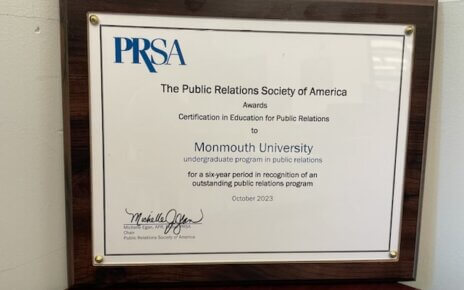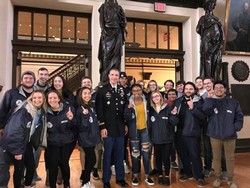The Department of Music and Theatre Arts offers an Applied Music Program that allows students to take one-credit private music lessons regardless of their major.
The program provides students of all majors the chance to learn a musical instrument with professional musicians. Upon filling out a registration form for a course and emailing it to Dr. Gloria Rotella, Director of the Applied Music Program, students can take a 50 minute long lesson once a week where they will learn the instrument of their choice.
“Applied Music study in the areas of voice, piano, strings, winds, brass, guitar and percussion serves those students pursuing a major in music education, music performance, music industry, and music theatre majors, as well as those non-majors who wish to develop musical skills primarily for personal enrichment,” Rotella said.
Daniel Martin, a music education major and IT minor, sees the program as a wonderful opportunity for students to take advantage of. “It gives students the chance to work one on one with professional level musicians for practically free.”
Professor Michael Gillette, a specialist professor of music and violin instructor, encourages students to take advantage of the private classes while they are at the University.
“Students not only in the department but across campus have a chance to take lessons here rather than going somewhere else to find a teacher. There’s no music department I can think of that doesn’t offer applied music on campus so the fact that we’re doing that and have been doing that for a few years now is a good step towards making this a better music theater d e p a r t m e n t . The objective is to serve the students and if they want to take lessons they should be able to do it here,” Gillette said.
The lessons are structured to not only teach students how to play a specific instrument but to give them an appreciation of music.
“I teach students who have never played before. Every semester I teach a few students who are interested in violin but have never played or picked up a violin. The idea is to teach them technique and to give them some appreciation for playing the instrument,” said Gillette. “In a lesson, I can’t speak for other professors here but I believe everybody is teaching the students basic repertoire, basic technique, and basic appreciation of playing the instrument or singing. The idea is to expose a student to the right technique and the right pieces to be playing that are appropriate for them in any particular stage of their development.”
In addition to the private weekly instructions, students are required to attend a performance class at the end of each week and to perform in one class at least once.
“This performance class gives students the opportunity to practice performance etiquette, practice performing in front of an audience, and gives you something to work forward to present,” Martin said.
According to Laura Dubois, professor of music, accompanist, and piano instructor, the job of creating the Applied Music Program was put upon her in 2003.
“At that point, private instruction was not offered to students. I came up with a system that is still in use today, though it has grown and evolved tremendously under the wonderful guidance of Dr. Gloria Rotella,” Dubois said.
According to Dr. David M. Tripold, Chair of the Music and Theatre Arts Department, the Applied Music Program was officially created in 2004 in order to have the department grow and to align itself with other institutions that offer music as a major. Since 2004, however, the program has grown in both the amount of students as well as in the professionalism.
“The department has grown quantitatively and qualitatively over the past 10 years,” Tripold said. “We now have about 130 music and theatre majors and offer a curriculum that is competitive with other institutions of our size.”
Dr. Rotella, who came to the program eight years ago, has created the most significant changes to the program, which include better organization and the increased professionalism of the performance lab.
“There has been a major change in performance class; the number of times a student is required to perform has increased, students are required to wear professional or performance attire, their performance is documented through the use of a rubric to give the students performance experience that relates more closely to the real world,” Rotella said.
In addition to the improvements already made in the department was the hiring of an accompanist for students when they perform.
“Hiring an official accompanist for the department was a decision made by Tripold. This decision was made to benefit the students and enhance their musical education. Prior to that, students had to pay additional fees for accompaniment. Having a departmental accompanist has given all students the opportunity to work with a professional pianist, regardless of their financial circumstances,” said Dubois.
Musical instruction is held in Lauren K. Woods Theater. Any students interested in taking classes should contact Dr. Rotella at grotella@monmouth.edu.




